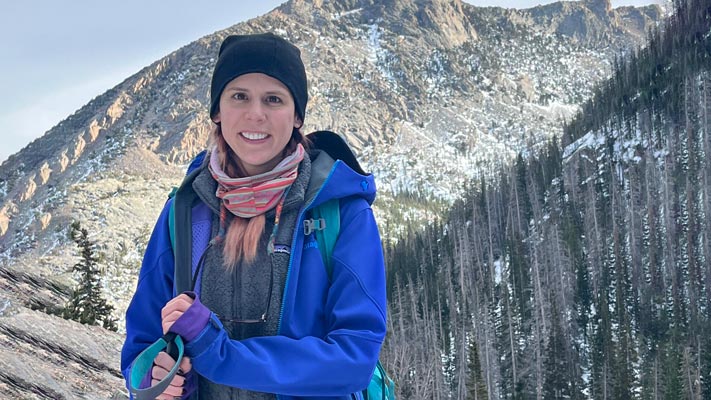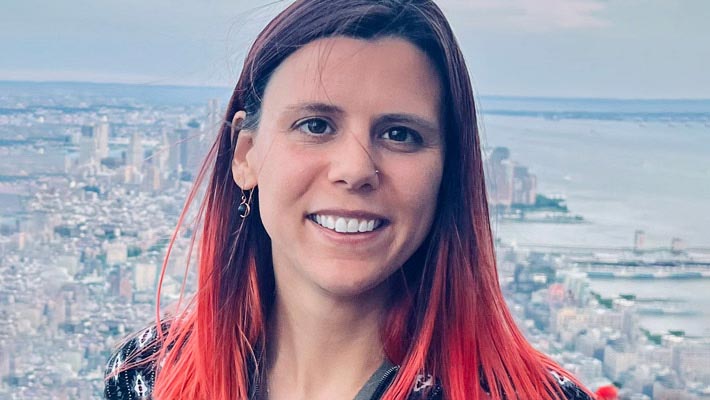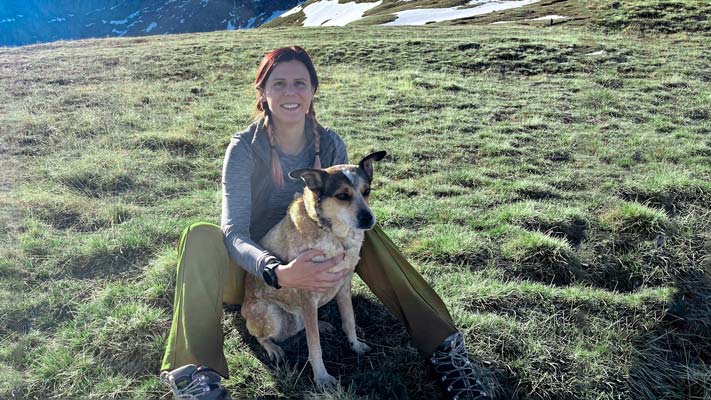CATEGORIES
Careers | People We Admire | STEMOverview:
- Morgan’s upbringing in nature and exposure to physics programs sparked her passion for science.
- She acknowledges the important role mentors played in her academic and professional development.
- She embraces and embodies the practice of celebrating mistakes as opportunities for growth and improvement.
- Similarly, Morgan encourages aspiring women in STEM to embrace setbacks as part of the learning process and actively seek mentorship.
1. Tell us about your childhood and background and how that shaped who you are today.
I am originally from Wisconsin, and as a child, I developed a strong connection to nature and the outdoors. My love for nature sparked my interest in the sciences. Additionally, exposure to theoretical physics programs on TV, like The Elegant Universe, further fueled my passion for science.
However, I didn’t have a clear career path in mind and hadn’t considered becoming a scientist or pursuing programming when I joined college. With time, I found myself drawn to science and mathematics. During my undergraduate years, I participated in a special program that brought together biology and math students to encourage interdisciplinary research. This experience piqued my interest in bioinformatics, eventually leading me to explore more interdisciplinary sciences.

2. Tell us about your professional journey and how you became a Bioinformatics Scientist and Algorithms Engineer.
My professional career has been a serendipitous journey. I happened to be in the right place at the right time when DNA sequencing was becoming common and affordable for university labs. In my applied mathematics program, I got involved in a microbiology lab project, which eventually became a long-term undergraduate job. Interestingly, nobody in the lab had strong engineering or programming skills, so I started using some of the publicly available tools.
I had gained some basic programming knowledge from my math classes. Being in the microbiology lab and having coding experience introduced me to bioinformatics. It was fun to work with real data, experiment, read research papers, and learn on the go. When I completed my undergraduate degree in applied mathematics, there were only a handful of bioinformatics graduate programs available. I decided to pursue a master’s degree in bioinformatics at the University of Oregon.
3. What one project or initiative do you consider your biggest achievement, and how did this accomplishment contribute to your personal and professional growth?
The most impactful project I have worked on was in 2018. I was part of an R&D team at a startup ArcherDx, collaborating with Dr. Abbosh at University College London Cancer Institute. We had access to a valuable dataset known as the TRACERx dataset. This dataset consisted of extensive patient samples over time, particularly from lung cancer patients. The collaborating lab, comprising MDs and PhDs, treated these patients and provided well-documented clinical data, including CT scans, treatment timelines, and blood draws. From this, we developed an algorithm for minimum residual disease detection.
Over time, this evolved into a product known as Personalized Cancer Monitoring (PCM) at Invitae. PCM involves sequencing the patient’s tumor sample and deriving a panel of variants specific to that tumor. We then design a targeted mutation panel for each patient. At each subsequent time point after surgery, we can check for the presence of these variants in the sample.
This method helps us determine if the cancer has recurred since surgical removal does not guarantee complete elimination. It not only alerts us to cancer recurrence but also assures patients when everything looks healthy, helping avoid treatments like chemotherapy or additional drugs when not needed. In fact, this work was published in Nature in April of this year. This marked a significant achievement in bringing advanced research closer to standard clinical practice.
It was a long but impactful project. With such projects, we are introducing cutting-edge research to clinical trials, bringing it closer to being used in standard-of-care settings.

4. As a woman in tech, what has been the greatest challenge in your journey, and how did you overcome it?
Social anxiety can make it challenging to speak up or ask questions in a general setting. When you’re the only female in the room, it becomes even more daunting. I’ve worked at a place where I was the only woman on a team of 20 bioinformaticians and engineers. I also often found myself either being the only woman or one of two in math classes as an undergraduate. So, I believe that it’s not about being comfortable with feeling embarrassed but rather not allowing it to hinder your progress. I was fortunate to have some exceptional bosses and coworkers who understood my preference for working one-on-one or in small groups and created a supportive environment.
5. Have you had any mentors throughout your career, and how have they influenced your life?
Certainly. I’ve been fortunate to have exceptional mentors throughout my academic and professional journey. During my undergraduate years, working in a microbiology lab, I had the privilege of learning from a remarkable mentor. She was a Principal Investigator (PI) running a predominantly female lab—a unique and inspiring environment in our institution. She was a powerhouse in the field and a brilliant scientist. Her dedication to fostering women in science left a lasting impression on me. The personal time she dedicated to one-on-one discussions with me was invaluable.
My undergraduate mentors were patient with me. They helped me with the fundamental concepts, even though they may have seemed rudimentary then. This was especially significant because academia can be extremely demanding, and people are often swamped with their responsibilities.
Moving into the industry, my boss played a pivotal role in my professional development. He was notably empathetic and created an environment where making mistakes was not only acceptable but also celebrated. When someone identified something wrong, it was seen as an opportunity to eliminate bugs from our system. Locating these bugs was no easy task, and acknowledging their existence and then resolving them was a moment of accomplishment.

6. Are there any emerging trends that you’re excited to explore in your work?
I’ve been using Databricks recently, which combines machine learning, data science, and data engineering seamlessly. It allows for thousands of machine learning experiments and integrates tracking through MLflow. This has been a powerful tool for managing and evaluating models.
7. How do you keep your knowledge up-to-date in the rapidly evolving field of bioinformatics?
When I’m interested in learning something, I seek a project that allows me to apply that skill. My work environment is particularly adept at facilitating this learning process. For instance, if I express interest in machine learning, they ensure that my next project involves machine learning. This approach allows me to acquire new skills while contributing to essential tasks.
In my personal time, I enjoy examining other people’s codes as a source of inspiration. I rely on my coworkers’ expertise to stay at the forefront of industry practices. Bioinformatics requires proficiency in multiple domains, such as biology, mathematics, statistics, machine learning, and software engineering. It’s impossible to be an expert in all these areas simultaneously, making it important to keep learning from others.
8. How would you advise girls who want to venture into STEM but hold back due to societal limitations or fear of failure?
There will always be a fear of failure, but it’s essential to understand that stumbling along the way doesn’t signify failure. For instance, you might not get the first job or program you apply for. However, that is not the end of the road; there are always more opportunities.
Seeking guidance from a mentor in your chosen field is invaluable. One piece of advice I received along my journey was to examine the LinkedIn profiles of individuals holding the position you aspire for. Their profiles serve as a roadmap for reaching that goal. Therefore, I recommend researching several people who have the job you desire to uncover the diverse paths they followed. If you can’t find someone who does what you aspire to do, you can always be the first.
Conclusion:
From childhood inspirations to unexpected career choices, Morgan Schroeder embraced serendipity in her journey. Despite challenges, she displayed resilience, sought mentorship, and embraced failure as a stepping stone to success. She encourages aspiring young girls in STEM to be bold in pursuing their passions and embrace the possibility of being trailblazers.


